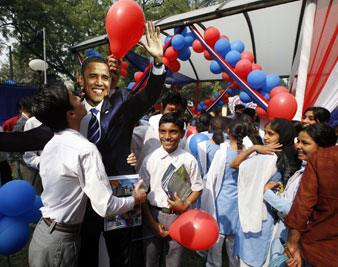 AP ImagesNew Delhi, India, Wednesday, Nov. 5, 2008.
AP ImagesNew Delhi, India, Wednesday, Nov. 5, 2008.
Bangalore
“He’ll never win,” declared my father-in-law with glum certainty, as I sat sweltering in the Indian heat in early September. “The Americans may want to elect him, but in the end they won’t do it. He’s a good man, but he’s black.”
More noteworthy than his cynicism is his unstinting support for a man who shares so little of his worldview. My father-in-law isn’t exactly a flaming liberal, yet like most educated middle- to upper-class Indians, he has developed a firm, near-irrational affection for a man known entirely through mostly admiring news articles and sound bites.
Over the past six months, the Indian media have displayed the classic signs of Obamamania that have become so familiar to most Americans: glowing editorials marking his “historic” nomination and election, an endless stream of advice from sympathetic pundits (including one columnist who suggested Obama take his cues from the Indian cricket team, no less), quirky stories about devoted fans (who in India seemed to prefer organizing pujas to meet-ups) and a tabloidlike obsession with his personality, his wife and kids, and most recently his hot bod.
The enthusiasm reflected in ad hoc street interviews and the rare opinion poll may not be representative–not in a country that remains largely rural–but it is hard to dismiss. Among those who know and care about US elections, Obama was indeed the favorite. Most reporters searched in vain for a McCain supporter–at least anyone who would admit to it–at the many election parties organized in cities like Delhi and Bangalore.
The level of good will is all the more remarkable for a man who may well end up–as most analysts here worry–on the wrong side of the issues the Indian middle class holds most dear: outsourcing, the Bush-sponsored nuclear deal and Kashmir/Pakistan. Most editorials cited Obama’s opposition to Bush’s policies, the very policies that made the soon-to-be former president more popular in India than in most other places in the world. These doubts about an Obama administration have not been ignored. The same editorials are laced with unease about his policy positions, and his passing suggestion that the United States should step in to help resolve the Kashmir dispute raised hackles all around.
But the skepticism has so far been overwhelmed by the undisguised pleasure of seeing a brown-skinned underdog triumph against all odds over a white establishment. While the narrative has universal appeal–not just for Indians and not just because they’re not white–the affection for Obama in India is tied inextricably to his race. The day after his victory, all the major newspaper headlines told the same story: Obama Reclaims American Dream; A Dream Alive in Our Time; Change Has Come to America; Race Ends in Historic Win: Dark Knight in White House. Responding to a ten-ton sand sculpture of Obama’s face created by a local artist and a team of schoolchildren in Puri, one local told reporters, “It is natural that everybody wants change. He is the historical figure in the world itself, as no black person has ever become the US president.”
Many Indians believe Obama’s victory makes all things possible for people of color everywhere–including the many American grandchildren, nieces, nephews and cousins who, thanks to globalization, are part of the Indian extended family. “My granddaughter can now be president of the United States,” boasted a university professor who was shopping at the local mall in Bangalore, echoing the sentiments of my mother, an aunt and her neighbor.
And yet for all the rhetoric about America’s racist history, Indians have preferred to avoid any mention of our ever-present racism. There’s been nary a word on the cognitive dissonance between all this Obama-love in a culture that refers to people of African origin as habshis, an epithet as offensive as the N-word. Like all well-indoctrinated postcolonial subjects, most Indians regard Africans with contempt for being poor, “backward” and, above all, black–a cardinal sin in a nation obsessed with skin color. (“Fairness” creams remain the top-selling cosmetic on the Indian market.) Sure, Obama was one of “us” when he was running for president. But he wouldn’t be if he were one of the many African students in, say, Delhi struggling to rent an apartment or hail a cab.
If the Obama candidacy evoked an overdue and necessary discussion about racism in America, perhaps it’s time that it did the same in other parts of the world–be it in India, Russia or France. There are plenty of cute and heartwarming stories about Indians and Obama, but a more telling example is the response of our cook, the well-meaning, kind, chocolate-skinned Mary. When I told her a black man was now the president of the United States, she looked confused and a little uncertain. “And is this a good thing?” she asked. Answering that question is likely as good a place to start as any.


